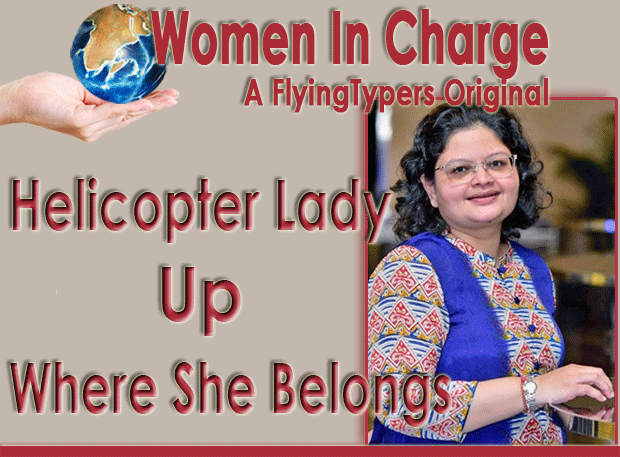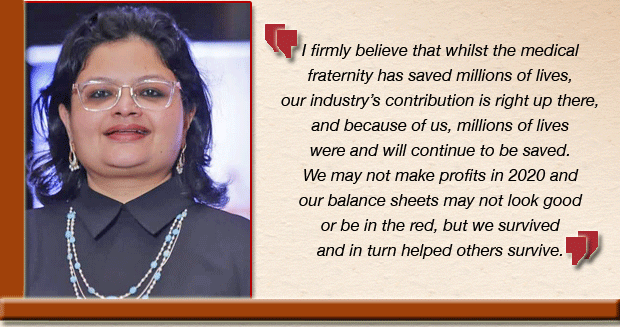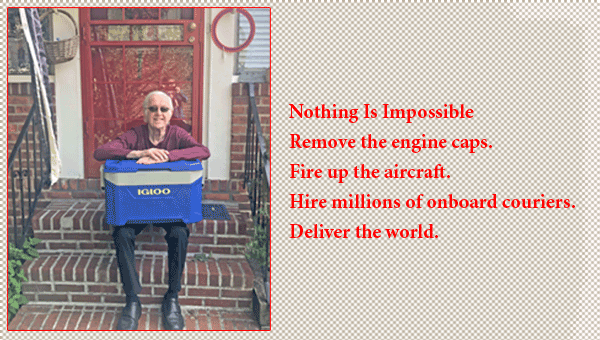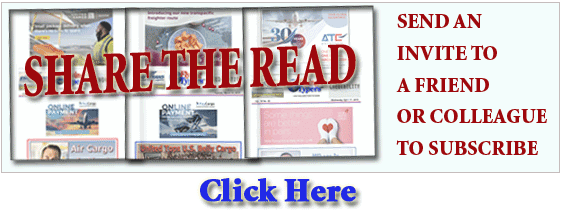 |
A logistics professional with over 22 years of experience, Mumbai-based
Chaitaly Mehta is the first woman in the family business – a third
generation customs broker and a second generation freight forwarder who
is at the helm of operations in her family-owned business, EKF Global
Logistics (formerly Express Kargo Forwarders Private Limited).
Her ability as a natural problem solver
and keen observer has allowed her to quickly learn the tricks of the trade
and carve out a niche for herself in this dynamic sector. Armed with a
law degree, Mehta is sought out amongst her peers for her ability to objectively
look at situations and provide valuable advice.
She states that logistics is a simple word
but with a complex connotation - it has so many branches that interconnect,
overlay, yet is a strong invisible thread that ties the world economy
together like what she describes as “Spiderman’s Web”!
Mehta firmly believes that the work she
and her team do, make the cogs in the wheels of World Economy go around
and this, she says, is a great thrill: “We actually make
a difference in people’s lives, albeit indirectly - and it is this
thought that makes me love my work and inspires me to work harder.”
Do you see the worldwide acclaim
for cargo as a positive for the future of the business?
CM: I
have always believed that the cargo and logistics industries have never
gotten the recognition they deserve. Cargo has always been short-changed
compared to the pax because cargo occupies the belly of the aircraft and
is the last priority after passengers’ baggage, courier, newspapers
and human remains!
This pandemic, however, has finally
brought to light the importance and essence of the logistics industry
and cargo itself. Whilst everyone was at home protecting themselves, it
was us in the industry who were the frontline players ensuring that all
the pharma meds, PPE kits and other essential items crucial to the COVID
19 recovery - were moved on time: Customs cleared, uplifted by the airlines,
transported and delivered.
The airlines, the airport custodians
like Mumbai International Airport, Indian Customs, the transporters, Customs
brokers, freight forwarders and labourers all rallied together without
any thought to their personal lives and ensured all critical equipment
and pharmaceuticals were delivered.
The only cargo moving for the first
three months of the pandemic were from the pharma industry and despite
the breakdown in the transport sector, (for example, the mass exodus of
drivers leaving their vehicles to flee to their villages at the peak of
the pandemic thereby creating a chaos never before seen) the industry
persevered. The customs brokers and the freight forwarders did everything
humanly possible to ensure that the cargo reached their final destination.
My company prioritized the safety
of our staff and closed for a month. Thereafter we re-opened with all
safety provisions. Since public transport was not available, we had and
still continue to have private pickup for our staff who live far away
and can’t use public transport. For our Mumbai staffers with small
kids we didn’t call them to work for a couple of months. We sanitize
twice a day at work and safety measures have been put in place so that
those who come to work are protected to the best of our ability.
To me, logistics is the backbone
of the economy and every single vertical is important in international
and domestic transportation, from labourers to forklifts and I could go
on and on. The logistics industry is akin to the spinal cord of a human
body. The different verticals are like the discs in the spine/vertebra
and both are undervalued, taken for granted and invisible, until something
goes wrong.
 |
How can air cargo best cope with the need
for the effective delivery of vaccine when the antidote comes?
CM: The
air cargo industry has been dealing with the shipping of vaccines much
before the average person realized the importance of a “vaccine”.
The airlines, the custodians, the Customs, the freight forwarders and
customs brokers are already handling huge volumes of vaccines and the
infrastructure is pretty good right now. India is one of the biggest exporters
of pharma in the world. However, having said that, due to COVID-19, the
airlines had raised their rates so high that shipping at that cost was
not practical but yet had to be done because of necessity.
We expect that the COVID-19 vaccine
will be ready soon; it would be prudent for the airlines to have air freight
rates which are more in line with pre-Covid times, and instead of taking
undue advantage of the circumstances, the priority should be to ensure
that everyone gets the vaccine so we can finally be done with this challenging
time and advance from the pandemic-hit global situation.
The pharma companies should already
be in talks with the players as in the airlines, custodians, logistics
companies like ours and come up with best practices on how to deliver
the vaccines efficiently. Right now, we have only a few airlines operating,
but once the vaccines are ready to be shipped, all the airlines will have
to restart because leaving only a few to handle the entire movement from
different manufacturers could create a cartel-like situation. Capacity
has to be increased because if there is no capacity, then space would
go to the highest payer of freight and it would not be good for the consumers.
The Customs, on their part, will
have to ensure that they have officers available in full strength at all
airports, and more importantly, that their systems are functioning optimally
because their systems have in the past let-down many-a-time, resulting
in increased dwell time. Since Customs is working 24x7, they are already
equipped but just need to make sure all their office positions are occupied
and prepared.
For the custodians of air cargo
complexes, they need to make sure that they have the space available to
store the vaccines, their infrastructure is up to date, they have no labour
challenges and their teams can handle the intense pressure that is going
to be created. The atmosphere is going to be electric, and every person
in the entire supply chain should and would feel proud of their successful
contribution to save the world.
I firmly believe that whilst the
medical fraternity has saved millions of lives, our industry’s contribution
is right up there and because of us, millions of lives were, and will
continue to be saved.
As the story of 2020 unfolds, what can
you share, especially perhaps a similar parallel experience during your
time in the industry?
CM: 2020
is a year that a majority of the population hasn’t seen. We have
had wars and famines and epidemics but never a pandemic, which literally
brought the entire world to a standstill. I have been in the industry
for the last 23 years and I have seen the depression of 2008 and at that
time, I and my colleagues in the industry thought we may not survive,
but, in fact, many of us did survive and victoriously so.
I have personally never seen anything
like this and to be honest the first month was overwhelming and I was
struggling to grapple with the situation. The best practices that I have
picked up from this are:
•
Technology is our friend and we have to embrace it.
•
Going forward, freight forwarders and customs brokers need to make
sure they are equipped with the latest technology, so if there is a second
wave, all the lessons learned should be remembered, incorporated and set
into practice for smooth operations.
•
Mobility is the key and it is important that at least 40 percent
of your staff come from nearby areas so that in such kind of situations
they can hold the fort if their colleagues who live far away can’t
make it.
•
Be positive and look at opportunities. Thinking of the negatives
alone will suck you like nothing ever.
•
Take the time to complete incomplete or pending projects, reconnect
with your staff, vendors, clients and partners. It helps you and helps
them.
•
Collaborations are the key to survival and longevity, so actively
go looking for possible ways of collaboration.
•
Maintaining a healthy bank balance is the most important because
if one does not have the cash, the company won’t survive.
•
Invest in training of your staff because it would pay off in such
situations.
•
Talk frankly and openly with your staff and team members. They need
assurance from you, but also the truth. Don’t paint a very grim
picture but don’t give false hopes, too.
•
Cost cutting doesn’t only mean firing staff, it also means
reevaluating your expenditure style and reducing or getting rid of the
money-guzzlers.
•
Most importantly, never give up and don’t forget your journey.
Since you didn’t quit when others would have expected, don’t
do so now. It is the survival of the fittest but your mental game will
keep you at the top, so be very strong mentally.
Can you share a favorite story from air
cargo? How has the industry ramped up its services to serve during the
pandemic that is outstanding when you think about your experience?
CM: My
favourite story: One of our verticals is aviation and I am very proud
to say that what we do for the aviation in toto, no one else does. Others
do bits and pieces, but not the whole thing. In fact, I am the only woman
in India handling this vertical including helicopters and, therefore,
in some circles I am called The Helicopter Lady.
I am a third-generation Customs
Broker and a second-generation freight forwarder. I am the first woman
in the air cargo industry in India at my level i.e. management and also
actively handling operations and field work, doing things no other woman
was doing at that time.
The aviation vertical was started
by me out of sheer desperation to survive as I didn’t want to be
labelled a quitter. In doing so, we broke a 40-year-old monopoly and today,
we are now the biggest company in India handling this sector. Companies
say they handle airlines and have aviation as a vertical but we actually
do the real thing. So, yes, I am really proud of my team and myself when
I look back and see how far we have come today.
This industry, especially in India
is heavily dependent on people even though we are now technologically-equipped
and a lot of work is done through systems. But, it is people who run these
systems. I am talking from India’s perspective now: we never imagined
work-from-home was possible for us and yet we have done it.
In the last five months companies
have made major investments in technology, as have we, and now we can
comfortably say we can work at least 60 percent from home, which is one
of the biggest achievements for us.
The Multinationals have always
had their systems and Indian companies were getting there slowly. However,
this COVID 19 situation has quickened our pace. All the stakeholders worked
together as a team to achieve the mammoth task of transporting cargo despite
the many issues and problems.
Logistics companies have spent
money in not only upgrading and ramping up their systems but also in making
offices safe for their staff to work in. Many of us have spent more money
on conveyance in bringing our staff to work with public transport not
working or in limited capacity, that our P&L has become lopsided.
The cost has hurt but we were there, we were making a difference, irrespective
of the hardships.
Personally, I have never felt more
proud of my team, my vendors, my partners—the airlines, the customs
or the custodian, the shipping lines and various other stakeholders because
we all stood strong and persevered.
We may not make profits in 2020
and our balance sheets may not look good or be in the red, but we survived
and in turn helped others survive.

|








